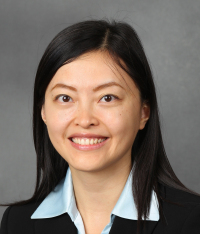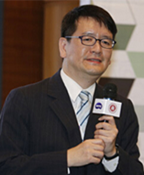
Fei Gao
|
Title:Building Open and Connected Online Communities for Learning
Abstract:
The abundance of social, mobile and gaming technologies has led to the rise and thrive of socially situated and interest driven online communities. By offering opportunities for personalized, just-in-time, and lifelong learning, online communities are changing the ways that we acquire, share and use information to co-construct new knowledge. According to research, however, only the most active digital learners are taking full advantage of such opportunities. Educators and researchers have struggled to find ways to harness the benefits of this new form of learning. In this presentation, we will explore the potentials and opportunities offered by online communities, the challenges of getting learners engaged and immersed in communities of practice, the effective strategies to create thriving online communities, and the future trends in building open and connected online communities for learning.
Biography:
Fei Gao is an associate professor in Learning Design in the Department of Visual Communication and Technology Education at Bowling Green State University. She holds a Ph.D. in Educational Psychology and Educational Technology from Michigan State University. Her research is focused on understanding the nature of interaction and learning afforded by emerging technologies, and exploring how to make learning more efficient, effective and engaging by tapping into the capacities of these technologies. Most recently, her interest in online communities has led her to conducting in-depth analyses of these communities by using a combination of traditional research methods, text mining techniques and social network analysis. Her work has been published in peer-reviewed journals, such as, The Internet and Higher Education and British Journal of Educational Technology. In addition to serving as reviewers for multiple esteemed journals in the field, she is President-Elect of the Research & Theory Division of the Association for Educational Communications and Technology (AECT), and a member on the Board of Directors of the Society of International Chinese in Educational Technology (SICET). |

Prof. Ying-Tien Wu
|
Title: Technology-enhanced knowledge building pedagogies in science education:Collaborative learning with socio-scientific issues
Abstract:
In the 21st century, citizens of democratic societies have an increasing number of opportunities to encounter a variety of socio-scientific issues (SSIs), which are social dilemmas with conceptual or technological associations with science. To solve these SSIs, people have to share their understanding and work collaboratively. As SSIs are relevant to students and can bridge school science and students’ real-life experiences, they have been used to provide meaningful learning contexts in science classes. When implementing SSI-based science instruction, knowledge building pedagogies could be helpful for improving students’ learning. In this talk, Knowledge Building Theory will be introduced firstly. Also, the findings derived from a case study on applying knowledge building pedagogies in SSI-based science instruction will be reported.
Biography:
Dr. Ying-Tien Wu received his Ph. D degree in Department of Earth Sciences (major in science education) at National Taiwan Normal University (NTNU) in Taiwan. He is now an Associate Professor in the Graduate Institute of Network Learning Technology at National Central University in Taiwan. Dr. Wu’s research work involves both science education and educational technology, and his research interests include inquiry-based learning, scientific reasoning and argumentation, knowledge building pedagogies, the use of gamification in education, technology-enhanced learning, and technological pedagogical content knowledge (TPACK).
Before his service in university, Dr. Wu had eleven years of elementary science teaching experience which benefits him for transforming educational theories into practice. He is keen to help teachers in practice to improve their teaching practices. His lab has also developed several online learning systems or platforms helping learning and teaching from elementary school to high school.
His research findings have also been published in reputable international journals in science education and digital learning, such as Science Education, International Journal of Science Education, Research in Science Education, Journal of Computer Assisted learning, and Educational Technology and Society. Except for being the associate editor for two influential academic journals, Dr. Wu also serves as the editorial board member or the reviewer for many influential academic journals in science education and educational technology. Owing to his outstanding research performance, Dr. Wu received the Ta-You Wu Memorial Award (Young Outstanding Researcher Award) from the National Science Council in Taiwan.
|

Prof. Jin-Hyouk Im
|
Title: MOOC-enabled Flipped Learning
Abstract:
Two major challenges for higher education are (1) improving quality and (2) reducing cost. Korea had been very successful in developing her economy by being a fast follower up until recently. Nowadays, however, it’s been trying to be a first mover by pursuing a creative economy. Universities are under pressure to equip students with creative talents such as problem-solving, critical thinking, collaboration, communication skills. On the other hand, they have been barred from raising their tuitions for four years in a row, thus suffering from financial hardships. Flipped learning (FL) and Massive Open Online Course (MOOC) are emerging as two promising alternatives to the traditional learning model of lecture-oriented passive learning. FL is mainly to deal with the first challenge of quality improvement while MOOC with the second one of cost reduction. There are rising interests in FL and MOOC in Korea, too. FL and MOOC originated as two different things with no common ground. However, it seems that there is a great potential for synergic effects when the two are blended for MOOC-enabled FL. UNIST’s experiments on this will be shared.
Biography:
Professor Jin-Hyouk Im holds a Ph.D. in Management Information Systems from the University of Nebraska-Lincoln. He has been interested in disruptive innovation in education for quality improvement, yet cost reduction. He pioneered the idea of IT-enabled active learning in Korea by flipping his classroom in spring 2009 when his institute, Ulsan National Institute of Science and Technology (UNIST), opened. Upon his success, he became instrumental in flipping over 100 courses (25%) in UNIST. Thanks to his long experiences in FL, he has delivered more than 100 speeches on disruptive innovation in education with MOOC and FL. Currently, he has been experimenting several different MOOC-enabled FL courses for synergic effects.
|
|

Dr. Lijie Lin
|
Title :Flipped Classroom and XAPI learning Data Analysis
Abstract:
The teachers’ role is transferring from a traditional “knowledge transmitter” to a facilitator in the classroom in the field of worldwide educational development, such as flipped classroom and other innovative teaching mode. It has been converted into learner-centered learning mode, that is, students acquire knowledge and enhance learning effectiveness through personal involvement, deep thinking, communication and discussions. This process also helps them to develop high level soft skills, such as coordination and communication, expression, cooperation, critical thinking, innovative ideas and etc. Due to the rapid development of educational technology, such as the trends of Internet, mobile applications, and digital convergence, a number of more effective tools have been generated in this filed, such as online MOOCs video learning platform (Coursera, Udemy, Academy Khan…), game based learning platform (PaGamO), instructional interactive system (TronClass) and etc. The new technologies further support teachers and students in the new mode of the flipped classroom, lower its threshold, and enhance its efficiency. In flipped classrooms, learning analytics will become an indispensable part.
Biography:
Dr. Lijie Lin graduated from Taiwan’s Hsinchu Jiao Tong University, and obtained the master’s and doctorate in computer science from the University of New York. During the graduate studies, he developed a worldwide first learning management platform Web Based Learning Management System. Dr. Lin worked at the IBM Watson research center as a researcher and was responsible for the design of Web-Based Healthcare Management System. In 1997, Dr. Lin returned to Taiwan and built an Internet company VISIONARY, which is one of biggest portal site in Taiwan as KIMO. From 2000 to 2003, Dr. Lin took a place as a researcher and visiting professor in the computer institute of Chinese Academy of Sciences (CAS) and Shanghai Jiao Tong University. During this period, Dr. Lin participated in the national high technology research and development program of China, namely 863 programs, and focused on the research and development of the standard specification for e-commerce technology in China.
|